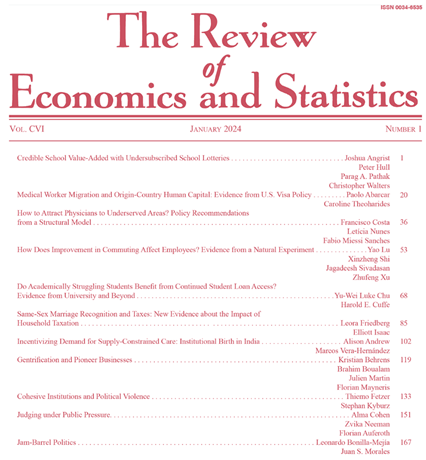The Model of Socio-Economic Stratification of Society Based on An Agent Approach, Taking Into Account Rank Exchange
IF 6.8
1区 经济学
Q1 ECONOMICS
引用次数: 0
Abstract
The purpose of the study is to demonstrate the possibility of adequate mathematical modeling of property inequality in a stratified society based on an agent approach, taking into account the unequal (rank) exchange between agents with different socio-economic status. To achieve this goal, it was necessary to solve the following tasks:1. To develop minimum criteria for the adequacy of mathematical models of socio-economic inequality.2. To substantiate the advantages of mathematical models based on an agent approach using rank exchange.3. To present the author’s version of the mathematical model of the goods’ movement in society based on an agent approach, taking into account rank exchange.4. To check the author’s mathematical model for compliance with the minimum qualitative criteria of adequacy and to create a quantitatively coinciding with the real distribution of the country’s population of the Russian Federation by income.5. Determine the limitations of the developed mathematical model by the authors.Materials and methods. The paper used statistical data from Rosstat, the Federal Tax Service of the Russian Federation, the World Bank, the US Bureau of the Census, the Edelman Trust Barometer, as well as data published by domestic and foreign researchers of inequality. These data were compared with the results of inequality calculations obtained using the mathematical model of the goods’ movement in society based on an agent approach, taking into account rank (nonequivalent) exchange.Results. The minimum criteria that any adequate model of stratification of society must meet are defined: 1. reveals a lognormal distribution of the population by income with a heavy tail; 2. reflects in long-term historical retrospect the trend of inequality growth; 3. demonstrates a short-term reduction of inequality during periods of socio-economic crises.The proposed model meets these requirements, it demonstrates not only qualitative, but also quantitative adequacy – reproduces by calculation the curve of the actual distribution of Russian society by income.Common concepts of inequality, in particular, the theory of superstars or skill-based technological change do not allow achieving such a result. The limitations of the created mathematical model are shown:– the impossibility of creating an adequate Lorentz curve with insufficient computing power;– inability to describe changes in cross-country inequality, since countries are not subjects of rank exchange, although interstate agreements certainly have an impact on the exchange between economic subjects of social interaction;– inability to describe situations of absolute poverty, i.e. long-term decline in income, although in the real economy such situations are sometimes observed;– the endless growth of inequality over time, whereas in reality economic processes of inequality growth are always opposed by social processes of counteraction to this growth.Conclusion. The mechanism of spontaneous emergence and growth of income (property) inequality as an inevitable consequence of market relations is demonstrated.The agent-based approach, taking into account the rank exchange, can allow identifying critical moments in time, after which extraordinary economic and socio-political consequences will have an irreversible character, and can also help in studying the influence of individual behavior of economic agents of different levels on the evolution of the entire economic, and as a consequence, socio-political system.The results obtained will be useful for strategic planning, when developing target indexes for the socio-economic development of regions and the country as a whole, and improving the methodology for calculating key performance indexes for civil servants基于代理方法的考虑等级交换的社会经济分层模型
本研究的目的是为了证明,考虑到具有不同社会经济地位的代理人之间的不平等(等级)交换,基于代理人方法的分层社会中财产不平等的充分数学建模的可能性。为实现这一目标,必须解决以下任务:为社会经济不平等的数学模型的充分性制定最低标准。为了证明基于秩交换的智能体方法的数学模型的优势。3 .在考虑等级交换的情况下,提出基于代理人方法的社会中商品运动的数学模型。4 .检查发件人的数学模型是否符合适当的最低质量标准,并在数量上建立一个符合俄罗斯联邦按收入划分的国家人口实际分布的数学模型。确定作者开发的数学模型的局限性。材料和方法。这篇论文使用了俄罗斯国家统计局、俄罗斯联邦税务局、世界银行、美国人口普查局、爱德曼信托晴雨表的统计数据,以及国内外研究不平等问题的研究人员发表的数据。这些数据与使用基于代理方法的商品在社会中运动的数学模型(考虑到等级(非等价物)交换)获得的不平等计算结果进行了比较。定义了任何适当的社会分层模型必须满足的最低标准:揭示了一个对数正态分布的人口收入与沉重的尾巴;2. 在长期的历史回顾中反映了不平等增长的趋势;3.在社会经济危机期间,证明了不平等的短期减少。所提出的模型满足了这些要求,它不仅在定性上,而且在定量上都是充分的——通过计算再现了俄罗斯社会实际收入分配的曲线。常见的不平等概念,特别是超级明星理论或基于技能的技术变革,不允许实现这样的结果。所创建的数学模型的局限性表明:-不可能在计算能力不足的情况下创建适当的洛伦兹曲线;-无法描述跨国不平等的变化,因为国家不是等级交换的主体,尽管州际协议肯定会对社会互动的经济主体之间的交换产生影响;-无法描述绝对贫困的情况,即收入的长期下降。虽然实体经济中的这种情况下有时观察;——不平等的无休止的增长随着时间的推移,而在现实的经济不平等增长的过程总是反对这个growth.Conclusion反动的社会过程。本文论证了收入(财产)不平等作为市场关系的必然结果而自发产生和增长的机制。考虑到等级交换,基于主体的方法可以识别出关键时刻,在此之后,特殊的经济和社会政治后果将具有不可逆转的特征,并且还可以帮助研究不同层次的经济主体的个人行为对整个经济演变的影响,从而影响社会政治系统。获得的结果将为战略规划是有用的,当开发目标指标地区的社会经济发展和国家作为一个整体,和改进的方法计算公务员的关键性能指标
本文章由计算机程序翻译,如有差异,请以英文原文为准。
求助全文
约1分钟内获得全文
求助全文
来源期刊

Review of Economics and Statistics
Multiple-
CiteScore
8.50
自引率
0.00%
发文量
175
期刊介绍:
The Review of Economics and Statistics is a 100-year-old general journal of applied (especially quantitative) economics. Edited at the Harvard Kennedy School, the Review has published some of the most important articles in empirical economics.
 求助内容:
求助内容: 应助结果提醒方式:
应助结果提醒方式:


